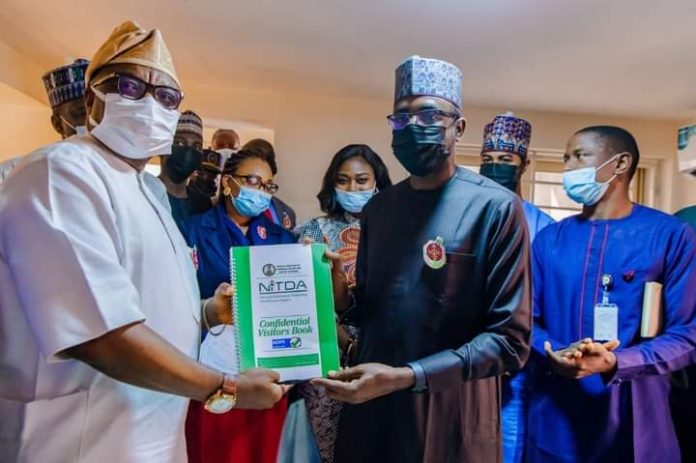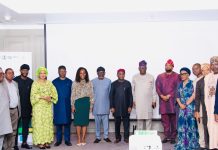The National Information Technology Development Agency, NITDA, is leading by example for being the first agency of government in Nigeria to implement a major aspect of the Nigeria Data Protection Regulation (NDPR) by launching the NDPR complaint visitors’ book today in Abuja.
The launching of the booklet was performed by the Director General of the Agency, Kashifu Inuwa, CCIE, shortly after the agency’s first staff meeting of the year 2022 with all staff in attendance physically and virtually, especially for those outside the headquarters on official assignments, zonal offices or on leave.
According to Inuwa; “It is NITDA’s mandate as enshrined in NITDA Act of 2007 to inter alia; develop regulations for electronic governance and monitor the use of electronic data interchange and other forms of electronic communication transactions as an alternative to paper-based methods in government, commerce, education, the private and public sectors, labour and other fields, where the use of electronic communication may improve the exchange of data and information”.
He said, “Recognizing that many public and private bodies have migrated their respective businesses and other information systems online, information solutions with both the private and public sectors now drive service delivery in the country through digital systems. These information systems have thus become critical information infrastructure that must be safeguarded, regulated, and protected against atrocious breaches”.
“Data protection applies to all transactions intended for the processing of Personal Data, notwithstanding how the data processing is being conducted or intended to be conducted in respect of natural persons in Nigeria’’, he said.
The DG stated that organisations in Nigeria were caught scrambling to comply with the NDPR when it was launched in 2019. “Most organisations especially Small and Medium Businesses (SMB) are finding it difficult to comply with some of the basic requirements of the regulation due to financial constraints,” he added.
Inuwa disclosed that a recent study has revealed that many Nigeria Public Institutions and small business owners are still confused by the rules around data protection and privacy regulations.
“Disturbingly, out of 30 surveyed, 100% confirmed their paper visitors’ books are not confidential and do not protect the visitors’ personal data. Another 98% admitted they do not dispose of paper visitor books securely and confidentially – leaving the personal data of millions of employees and customers at risk,’’ he lamented.
He explained that when putting NDPR procedures in place, it’s very likely that many organisations did so with one big misconception that the new law only affects data collected online. The NDPR is technology-agnostic. It applies to all acts of personal data collection and processing, no matter how and where it takes place, visitor data, employee personal data, etc.
Inuwa submitted that the Data Services Protection Limited (DSPL) patented visitor’s book was selected amongst the most innovative NDPR product at 2021 Privacy Week organised by NITDA. The visitor’s book pages are duplicates and works by making personal details on the visitor’s book invisible on the first page while capturing the data on the duplicate page. This basic but ingenious visitor’s book is cheap in comparison with the expensive digital visitor’s management solutions.
He, however, noted that the visitors’ book is an addition to the processes of computing the visitors’ data electronically.
Among the highlights of the staff meeting was the presentation of a plaque of recognition to the staff of the quarter Mr. Peter Chucks Emakpor, a staff of the e-Government Training Center, Kubwa, Abuja, by the Director-General.








